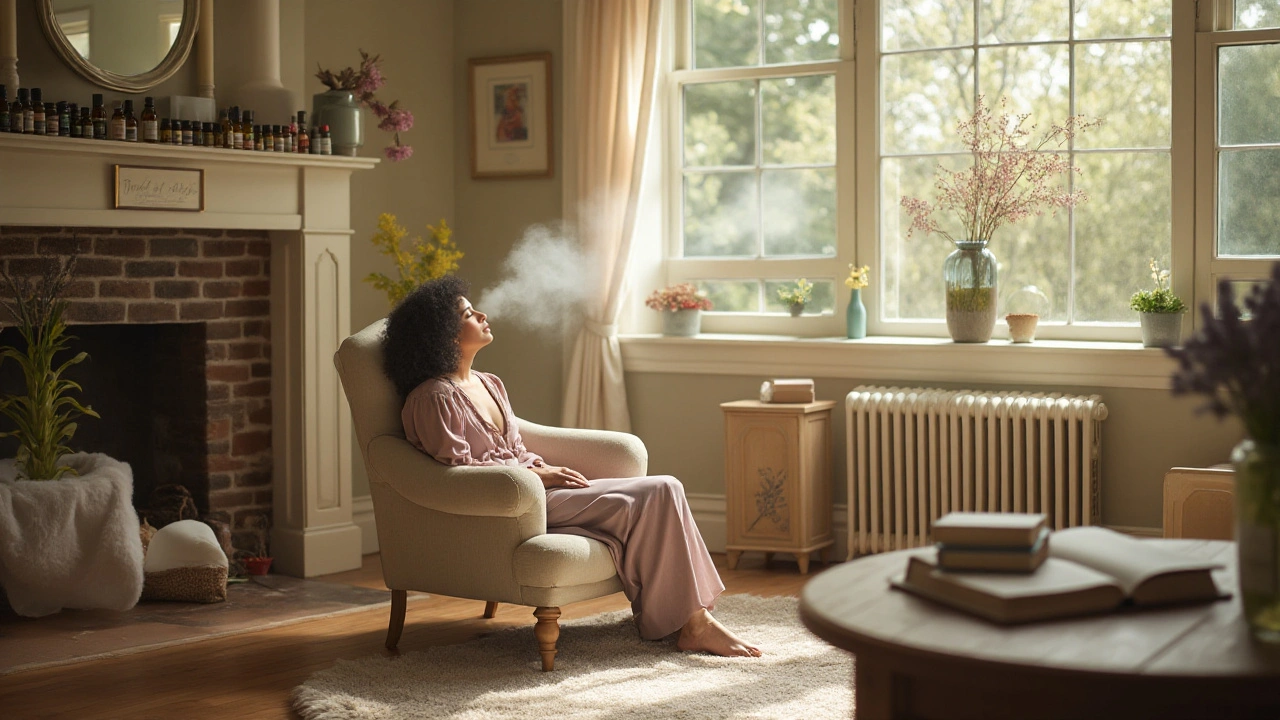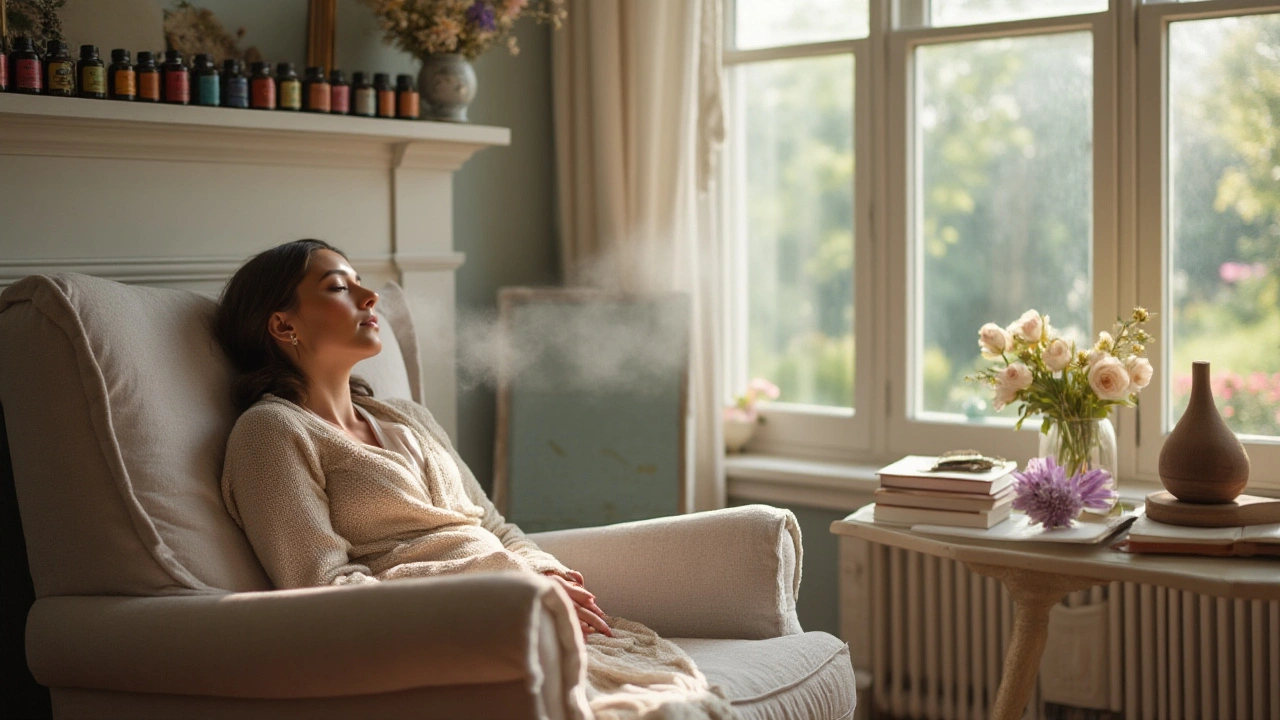Aromatherapy has been used for centuries to heal the mind and body through the power of scent. It's not just a buzzword for spas and luxury treatments; it’s a natural way to boost your emotional well-being. This method employs essential oils derived from plants, each with unique properties that can influence your mood and mental health.
In this article, we’ll explore how aromatherapy can become a part of your daily routine to help you manage stress, anxiety, and even boost your overall mood. We’ll break down the science behind it, recommend the best essential oils, and offer practical tips for making aromatherapy a seamless addition to your life.
- Introduction to Aromatherapy
- How Aromatherapy Affects the Brain
- Popular Essential Oils for Emotional Wellness
- Practical Tips for Using Aromatherapy
- Creating a Personalized Aromatherapy Routine
Introduction to Aromatherapy
Aromatherapy, the art and science of using naturally extracted aromatic essences from plants, has been practiced for thousands of years. Ancient civilizations—including the Egyptians, Chinese, and Greeks—utilized different forms of essential oils not just for their pleasant scents, but for their healing properties. Fast forward to modern times, this practice is not only widely embraced in holistic health, but is also researched and validated by scientific communities.
The core of aromatherapy lies in essential oils which are concentrated liquids containing volatile aroma compounds from plants. These oils are inherently complex mixtures of various chemical compounds, each contributing to its unique effects. For instance, lavender oil is often cited for its calming properties, while eucalyptus oil can invigorate the senses and improve respiratory function. By merely inhaling these essences, you can positively impact your brain function and overall well-being.
“Aromatherapy can be a powerful tool for managing emotional well-being, especially when used in a routine. It’s an underutilized option for many looking to enhance their mental health naturally,” says Dr. Jane Buckle, an expert in clinical aromatherapy.
Aromatherapy primarily works through the limbic system, a complex set of structures in the brain responsible for mood and emotion. When you inhale essential oils, tiny scent molecules travel up through the olfactory neurons into the brain. From there, they can influence different areas—like the amygdala, which plays a significant role in memory and emotional response.
Importantly, not all essential oils are created equal. The purity, concentration, and extraction process can greatly influence an oil's effectiveness. So, it’s crucial to source your oils from reputable suppliers who provide high-grade, organic options. Whether you're looking to de-stress after a long day or seek a midday energy boost, selecting the right essential oil can make all the difference.
Using aromatherapy isn't about quick fixes. It's about integrating a natural, holistic practice into your lifestyle to foster sustained emotional well-being. To kickstart your journey, you might want to begin with a few commonly known oils like lavender, peppermint, and eucalyptus. Their multipurpose benefits make them a great starting point. From using a diffuser to adding a few drops in your bathwater, the possibilities are endless.
How Aromatherapy Affects the Brain
The science behind aromatherapy is both fascinating and complex. When you inhale essential oils, the scent molecules travel through your olfactory system, which is directly linked to the brain’s limbic system. This area of the brain is responsible for emotions, memory, and even behavior. So, when you deeply breathe in a soothing lavender or invigorating peppermint, these scents can have a profound impact on how you feel.
The limbic system acts almost like a central hub for managing emotions. The scent molecules stimulate this part of the brain, causing the release of neurotransmitters such as serotonin and dopamine, which play critical roles in regulating mood. It’s no wonder that the smell of fresh lavender can make you feel calmer and more relaxed almost instantly. Some researchers believe that this natural response may be rooted in our evolutionary past, where certain smells indicated safety or danger, affecting our emotional reactions.
Another interesting aspect is how quickly aromatherapy can work. Studies have shown that the effects of inhaling essential oils can be felt within minutes.
According to Dr. Alan Hirsch, a neurologist, "The olfactory system is a direct link to the brain, bypassing the rational parts and affecting emotional centers immediately." This is why aromatherapy is often used in treatments for stress, anxiety, and even depression.There’s something almost magical about how scents can instantly transport you to a different mental space. For example, the smell of eucalyptus can clear your head, and citrus scents like lemon or orange can enhance your mood and energy levels.
It’s important to note that not all essential oils affect everyone in the same way. Your personal experiences and memories associated with certain scents can alter their effectiveness. That’s why creating a personalized aromatherapy routine can be so beneficial. For instance, if you have fond memories tied to the scent of pine from your childhood, using pine essential oil may bring about a sense of comfort and peace that you might not get from another scent.
Lastly, there are different methods to use essential oils for emotional well-being. Some prefer diffusers that spread the scent throughout a room, while others may find direct inhalation from a tissue or a soothing aromatherapy bath more effective. Whatever the method, the key lies in finding what works best for you and integrating it into your daily regimen.

Popular Essential Oils for Emotional Wellness
When it comes to enhancing emotional wellness, certain essential oils stand out due to their specific properties and benefits. Let's dive into some of the most popular ones that can help support your mental health.
Lavender is perhaps the most well-known essential oil for calming and relaxation. Extracted from the lavender plant, it has a floral scent that's typically associated with peace and tranquility. Numerous studies have shown lavender's effectiveness in reducing stress and anxiety levels. In fact, a study published in the *Journal of Alternative and Complementary Medicine* found that participants who inhaled lavender oil reported significantly less stress than those who didn't. This makes it a great choice for diffusing before bedtime or during stressful periods.
Another powerful oil is Bergamot. This citrus-scented oil not only uplifts the mood but also has a soothing effect. Bergamot oil is recognized for its ability to reduce anxiety and improve moods. Research, including a study in the *Complementary Medicine Research Journal*, has shown that bergamot can help lower levels of cortisol, which is the body's stress hormone. Its fresh and fruity aroma makes it perfect for morning use, setting a positive tone for the day ahead.
Chamomile is another essential oil that deserves a mention. Known mainly for its inclusion in calming teas, chamomile oil also works wonders for emotional well-being. It has anti-anxiety properties that help to calm the mind. According to a study in the *Journal of Clinical Psychopharmacology*, inhaling chamomile can significantly reduce anxiety levels. Its gentle, apple-like scent is both soothing and refreshing, making it great for both children and adults.
Ylang Ylang oil offers a sweet, floral aroma that can help balance emotions. This essential oil is derived from the flowers of the Cananga tree, native to tropical Asia. It's known to decrease stress and lift the mood. In a study conducted by researchers at Geochang Provincial College in South Korea, Ylang Ylang was found to reduce anxiety in participants, highlighting its effectiveness in promoting emotional wellness. Adding a few drops to your diffuser or even your bath can provide a serene and uplifting experience.
Finally, there's Rose oil, which is highly regarded for its mood-enhancing properties. Rose oil helps combat feelings of depression and anxiety, thanks to its rich and floral fragrance. The *Iranian Journal of Basic Medical Sciences* reported that rose oil could effectively reduce postpartum depression, showcasing its potential mental health benefits. This essential oil is best used in a diffuser or as part of a relaxing massage oil blend.
Incorporating these essential oils into your daily routine can make a significant difference in your emotional wellness. Each oil has its unique scent and properties, making it easy to find one that suits your needs. Whether you're looking to reduce anxiety, improve your mood, or simply create a calming environment, these essential oils can offer a natural and effective solution.
Practical Tips for Using Aromatherapy
When it comes to incorporating aromatherapy into your daily life, the possibilities are endless. The key lies in knowing how to maximize the benefits of essential oils for your emotional well-being. Here are some practical tips to help you make the most out of your aromatherapy journey:
Start with Diffusion
One of the simplest and most effective methods of using essential oils is through diffusion. A diffuser disperses essential oils into the air, allowing you to inhale the therapeutic properties. Choose a high-quality diffuser and place it in a room where you spend most of your time. For relaxation, try lavender oil. For an energy boost, opt for citrus oils like orange or lemon. Make sure to follow the manufacturer's instructions for the proper use and maintenance of the diffuser.
Topical Application
Applying essential oils directly to the skin can offer targeted benefits. However, it’s crucial to dilute essential oils with a carrier oil (like coconut or jojoba oil) to prevent skin irritation. For stress relief, blend a few drops of chamomile oil with a carrier oil and massage it into your temples and neck. For better sleep, try applying diluted lavender oil to the soles of your feet before bed.
Aromatherapy Baths
Adding essential oils to your bath can create a calming and restorative experience. Mix 10-12 drops of your chosen essential oil with a tablespoon of carrier oil or unscented bath gel before adding it to the water. This method helps the oil disperse evenly, ensuring you get the full benefit without irritating your skin. Eucalyptus oil is excellent for a refreshing bath, while ylang-ylang can help to relax and unwind.
Inhalation Methods
If you're looking for quick relief from stress or anxiety, inhalation is a fast and effective method. Place a few drops of essential oil on a tissue or cotton ball, and inhale deeply. This can be done in intervals throughout the day as needed. Another method is steam inhalation, which involves adding a few drops of essential oil to a bowl of hot water. Cover your head with a towel and inhale the steam for a few minutes. This is particularly beneficial for respiratory issues.
Creating a Personalized Routine
The key to effective aromatherapy is consistency and personalization. Experiment with different oils and methods to find what works best for you. Keep a journal to note the effects of various oils on your mood and well-being. Over time, you’ll be able to create a tailored aromatherapy routine that aligns perfectly with your needs and preferences.
"Aromatherapy can be as effective as you make it. The right scent in the right moment can transform your emotional state." — Dr. Jane Buckle, Aromatherapy Specialist
Incorporating these practical tips into your daily routine can significantly enhance your overall mental health. From diffusing calming scents to applying oils topically, aromatherapy offers a natural and enjoyable way to improve your emotional well-being. So go ahead, experiment with different oils, and discover the transformative power of aromatherapy.

Creating a Personalized Aromatherapy Routine
Personalizing your aromatherapy routine can be a rewarding and transformative experience. It's not just about picking a scent you like; it's about understanding how different essential oils can address your specific emotional needs. Whether you’re looking to reduce stress, boost your mood, or find balance, creating a routine tailored to you can provide a holistic improvement in your emotional well-being.
Start by identifying what you hope to achieve with your aromatherapy practice. This could be as simple as reducing daily stress or as specific as improving sleep quality. Write down your goals, as having a clear target can guide you in choosing the right essential oils. Research how different oils can support emotional wellness. For example, lavender is known for its calming effects and can help you de-stress, while citrus oils like lemon and orange can uplift your mood.
Choosing Your Essential Oils
Once you have your goals in mind, select oils that align with those needs. If you’re new to aromatherapy, it might be helpful to start with a few versatile oils before expanding your collection. Some popular choices for emotional well-being include lavender, chamomile, ylang-ylang, and bergamot. Each oil has unique properties, so don’t be afraid to experiment and see what works best for you. Remember, the journey to improving your emotional well-being should be enjoyable and not stressful.
"Aromatherapy can be a very effective way to boost your mood and emotional health. It’s a simple yet powerful tool for enhancing your overall wellness," says Rachel Herz, a neuroscientist and the author of 'The Scent of Desire'.
Incorporating Aromatherapy into Daily Life
Incorporating aromatherapy into your daily routine doesn't have to be complicated. Start by choosing a time of day when you can regularly practice, such as during your morning routine or before bedtime. Consistency is key in building a beneficial habit. Consider using a diffuser to disperse the essential oils in your home or workspace. Diffusers are effective in creating a calming environment and can run for hours, providing continuous benefits throughout your day.
Another way to use essential oils is through direct inhalation. You can do this by placing a few drops of oil on a tissue or cotton ball and taking deep breaths. This method is particularly useful for quick emotional pick-me-ups. Also, consider creating a blend tailored to your needs. Mixing various oils can provide complementary benefits, enhancing your overall experience. For instance, combining lavender and chamomile can offer a harmonious blend for relaxation.
Making Aromatherapy a Lifestyle
To make aromatherapy an integral part of your lifestyle, think beyond individual sessions. Incorporate essential oils into different facets of your life. For example, add a few drops to your bath for a relaxing soak, or use them in massage oils to relieve muscle tension. You can even create homemade sprays to freshen up your linens or your living space. The key is to find ways that naturally fit into your life, making the practice as seamless as possible.
Don’t forget to track your progress. Keeping a journal can be an excellent way to record how different oils affect your mood and emotional state. By noting down your experiences, you can fine-tune your routine and discover which blends work best for you.
The Benefits of a Personalized Routine
Creating a personalized aromatherapy routine is not just about the immediate benefits but also about long-term emotional health. Regular use of essential oils can lead to lasting improvements in mood, stress management, and an overall sense of well-being. This practice can become a grounding ritual, offering emotional support through life's ups and downs.
Investing time in personalizing your aromatherapy routine is an investment in yourself. Whether you’re using it for relaxation, mood enhancement, or emotional balance, a well-crafted routine can make a significant difference in your life. So take the time to explore, experiment, and enjoy the journey towards better emotional well-being.
